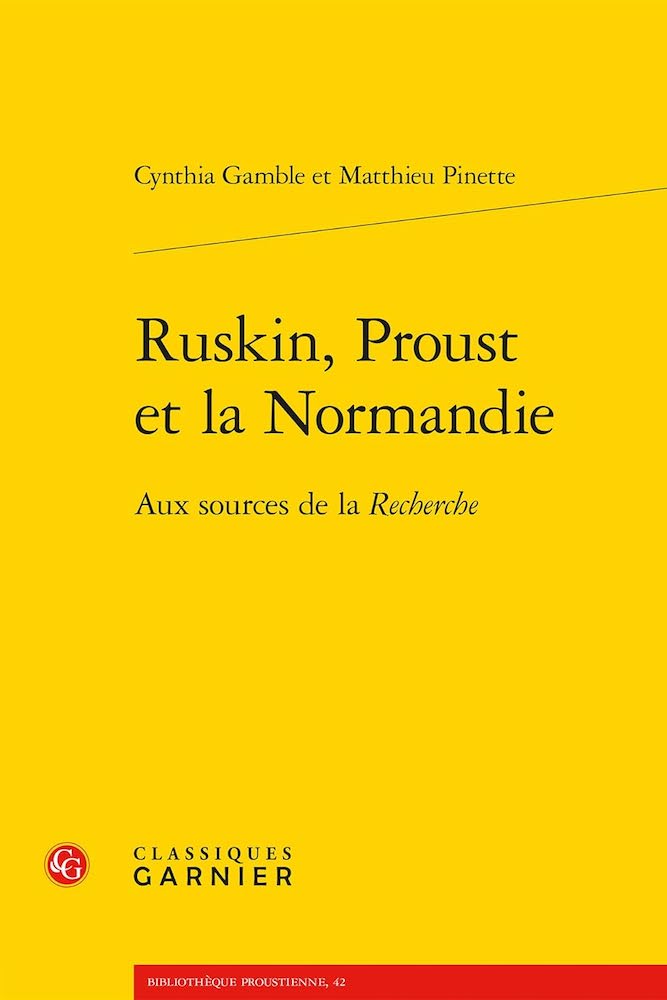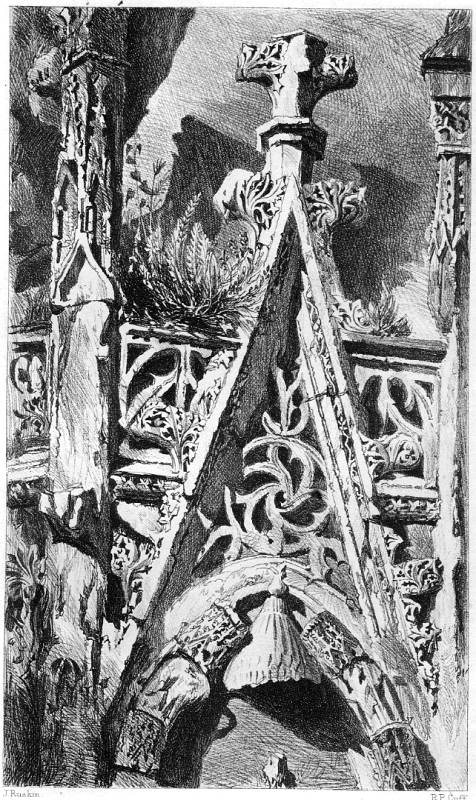
Ruskin, Proust et la Normandie: aux sources de la Recherche, by Cynthia Gamble and Matthieu Pinette, is a ground-breaking study of a fascinating subject. This generous and substantial book effectively continues Dr Gamble's previous pioneering work, L'oeil de Ruskin and her highly respected scholarship on Proust. She and her co-author have a wealth of knowledge which stretches through large passages of art history as well as literature and will be of interest to all French-speaking readers and enthusiasts of Normandy, a home for many of the Impressionists and a source of inspiration for their stylistic predecessor, J.M.W. Turner whom Ruskin, of course, championed in Modern Painters.
Dr Gamble and M. Pinette give the reader the illusion that we are accompanying Ruskin and Proust around Normandy in two different periods of time. Their journey takes us most especially to Rouen and displays a depth of knowledge of the medieval period, especially in architecture, which is formidable but also enlightening and a pleasure to read.
Faithful to the English texts of Ruskin, the authors print extracts from his work in the original, and then, for French readers, they provide a convincing French translation. This has the advantage of bringing the voice of Ruskin into the book, enabling us to "hear" it in his own words. We also hear about the academics who influenced and guided the young Ruskin, William Whewell and Robert Willis from Cambridge University.
Beautifully reproduced watercolours by Turner and drawings by Ruskin himself illustrate or rather illuminate, Ruskin's odyssey around the Normandy countryside which the young English sage described thus, "the loveliest tree country I ever saw, glittering in a green under sunshine after rain - with views of it from the tops of hills, a kind of Warwickshire and Lombardy; the fresh green of the one; the richness and sky above of the other."
Ruskin's highly detailed drawing of the church of Notre Dame at Saint-Lô demonstrates his own mastery as a topographical draftsman and begs to be compared with the early, painstaking drawing methods of Turner while his graphite studies of the streets of Rouen and Dieppe are so modern in their handling, they look forward to Walter Richard Sickert's drawn and painted views of Dieppe, especially of the church of Saint-Jacques, later in the twentieth century.


Left: Engraving of Ruskin's drawing of part of the Cathedral of St. Lô, Normandy. Right: Ruskin's watercolour of Old Houses and Tower, Rouen.
Halfway through this thoroughly absorbing book, we are introduced to Proust - as if he needs any introducing! - who is on the same trail as Ruskin or sur les traces. But, most unfortunately, Cabourg is as close as Proust gets to England, and it is greatly to be regretted that although he was an expert on English manners and fashion and Anglomania that had had such an impact on French art and life in the nineteenth-century, Proust never knew at first hand post-Wildean Mayfair society or went to the races at Epsom or even had a flutter at Royal Ascot. Instead, he went no further than the Côte d'Opale, enjoying instead the pleasures of the automobile and the freedom it afforded him to enjoy the countryside and imbue himself with the spirt of John Ruskin!
This book is essential reading for scholars of Ruskin and Proust, but it is also for all those who would like to see and enjoy the art and literature which lie behind the green and gothic mask of Normandy.
*Note: Dr Halliday, who lives in the Loire Valley in France, is a highly successful artist whose own book, Tante Brutus, published by Pegasus in January 2024, is a gripping — and very entertaining! — story of intrigue in the world of art history, set in France, Cambridge and London. — JB
Links to Related Material
- Ruskin, A Catalyst for Proust
- [Review of] Cynthia Gamble's Voix entrelacées de Proust et de Ruskin
- With The Ruskinians in St. Lô, Coutances, and Bayeux
- With the Ruskinians in Rouen
Bibliography
Gamble, Cynthia, and Matthieu Pinette. Ruskin, Proust et la Normandie: aux sources de la Recherche. Paris: Classiques Garnier, 2022. 436 pp. £36.89 ISBN: 978-2406130482.
10 October 2023